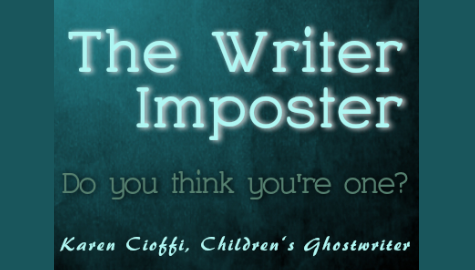I watched an amazing Zoom webinar with Carolyn Howard-Johnson and her publisher Victor Volkman. It was from the Upper Peninsula Publishers and Authors Association Writing Conference – they did it virtually rather than in-person.
Carolyn is an award-winning author and an expert book marketer, so I listen when she has something to share.
A small part of her talk was about the imposter syndrome.
Making it easier to understand, it’s the ‘I’m not good enough’ syndrome.
According to Wikipedia, the “imposter syndrome is a psychological pattern in which an individual doubts their skills, talents or accomplishments and has a persistent internalized fear of being exposed as a fraud.”
So, what does this have to do with writers?
Well, once we feel we’re not ‘really’ a good writer, we begin to underestimate our ability and our value.
Unfortunately, this syndrome seeps its way into new and even seasoned writers, and it can cause consequences.
The ‘I’m not a good enough writer’ syndrome, or I’m a fraud, and sooner or later, everyone will know.
Have you ever felt like this?
Once a writer has these feelings, they can fester and grow, stopping her from moving forward.
Maybe she’s been thinking of seeking an agent’s representation.
Maybe he’s thought of submitting to traditional publishers.
Maybe he’s wanted to get articles published in magazines, like Writer’s Digest, The Writer, or another magazine.
BUT …
She doesn’t think she’s good enough, so she doesn’t even try.
There’s an expression I love: Nothing ventured, nothing gained.
Try to remember that you don’t have to be the best writer on Earth.
It’s not the best writer who succeeds; it’s the writer who perseveres. And part of perseverance is to submit your work.
It’s about writing the book you want to write and self-publishing if that’s the route you want to go.
It’s about submitting your manuscript to agents and publishers.
That said, it is important to, at the very least, make sure you know how to write.
- Read a lot.
- Read books the agent has represented if that’s what you want to do.
- Read books that the publisher has published if that’s your dream.
- Read ‘quality’ books in the genre you want to write.
- Take the time to learn how to write if you haven’t yet. There are excellent online classes that can help you with this.
Another problem is if a writer with this syndrome offers services, like editing or ghostwriting.
If you’re offering writing services and don’t believe you’re qualified enough to provide these services, you’re in trouble.
- The first thing that will happen is you won’t charge what you’re worth. This thought process can cause a writing domino effect.
- Your lower prices will cause some potential clients to believe you’re not as good as other services charging more.
- You may let clients tell you how to write. Or, you may not be confident to explain to your client that what he has done or wants to do won’t work.
- You’ll second-guess almost everything you do.
If you have these feelings, it might be helpful to create a vision board.
Put a few quotes or sayings that will help you believe in yourself. Be sure to keep it where you’ll see it every day!
And another good idea is to keep learning your craft.
Learning to write also goes for wannabe authors. Learn about writing by reading books in the genre you want to write, and then go for it.
If you need help with how to go about it, I’ll be happy to jump in. Email me Whether you need ghostwriting, rewriting, or coaching, and we can discuss your project.
To watch Carolyn’s talk, which has lots of book marketing tips, CLICK BELOW:

I’m a working children’s ghostwriter, editor, and coach. I can help turn your story into a book you’ll be proud to be the author of, one that’s publishable and marketable.
OTHER HELP I OFFER:
FICTION WRITING FOR CHILDREN COURSE
A guided self-study course and mentoring program.
HOW TO WRITE A CHILDREN’S FICTION BOOK
A DIY book to help you write your own children’s book.
You can contact me at: kcioffiventrice@gmail.com.

Get Clear About Your Ultimate Writing Goals
Middle Grade Book Versus Young Adult Book
Supporting Characters and Your Story

